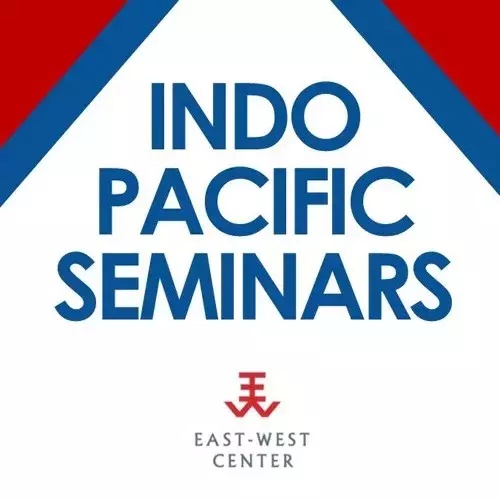Error message

OFFICE/DEPARTMENT
The East-West Center in Washington invites you to an
Indo-Pacific Political Economy and Trade Virtual Seminar:
‘On Unequal Footing: Strategic Dissonance & Failures of Competition in US-Japanese Efforts to Promote Better Quality Infrastructure Investment in Southeast Asia’
Featuring:
Dr. Pon Souvannaseng
Visiting Fellow,
U.S.-Japan-Southeast Asia Partnership in a Dynamic Asia Fellowship
East-West Center in Washington
Dr. Satu P. Limaye (Moderator)
Vice President, East-West Center &
Director, East-West Center in Washington
This presentation discussed a host of issues which lie beneath the surface of US-Japanese diplomatic discourses and policies to promote development financing for ‘quality infrastructure’ projects in Southeast Asia. While both countries share a common

diplomatic language, the presentation will outline how their strategic goals differ and create limits to coordination and desired policy outcomes with respect to energy infrastructure projects in Mekong Southeast Asia. Recent US outward development finance policy has sought to catch up and compete with alternative sources of infrastructure finance, particularly from China, without adequate whole-of-government and business coordination, strategy or resources. This has been to the neglect of efforts to credibly enforce rules for competitive market practices in the ASEAN private and development finance space, resulting in dual failures of competition. Prioritizing development and export finance competition over efforts to constrain rival regional investors has created an ambivalent position for Japanese policymakers and hampered efforts to push for more harmonized and better socio-environmental standards for quality infrastructure in Southeast Asia.
Speaker Biographies
Dr. Pon Souvannaseng is a political economist and holds a PhD from the London School of Economics & Political Science. She currently serves as Post-Doctoral Research Associate at the University of Manchester’s Centre for Crisis Studies & Mitigation. Her research examines the political economy of energy and infrastructure financing in the developing world. She is particularly interested in Asian regional private and public investment in the energy and infrastructure sector, as well as issues of financial and banking regulation in the East and Southeast Asian region. Her expertise is in issues of environmental governance and development finance with extensive experience in Southeast Asia and Africa. She was a lead investigator in the ‘Mapping Infrastructure Finance’ program of a UKRI-funded research consortia connecting biophysical and social science research on water-energy issues. She has been a Fulbright Research Scholar and was named a 2020 Mansfield-Luce Asia Policy Scholar and 2019 APSA Asia Fellow. She has previously served as a researcher at the United Nations Research Institute for Social Development, ASEAN Labour Secretariat and as a Fellow in Political Economy & International Development at University College London.
Satu Limaye is Vice President of the East-West Center and the Director of the East-West Center in Washington where he created and now directs the Asia Matters for America initiative and is the founding editor of the Asia Pacific Bulletin. He is also a Senior Advisor at CNA Corp (Center for Naval Analyses) and Senior Fellow on Asia History and Policy at the Foreign Policy Institute at Paul H. Nitze School of International Studies (SAIS). He is a magna cum laude and Phi Beta Kappa graduate of Georgetown University and received his doctorate from Oxford University (Magdalen College) where he was a George C. Marshall Scholar. Recent publications include: “America’s ‘Pacific Principle’ in an Indivisible Pacific Islands Region,” (Asia-Pacific Bulletin); “Despite Stumbles, America’s Engagement with Southeast Runs Deep,” (Global Asia); Raging Waters: China, India, Bangladesh, and Brahmaputra Water Politics (Marine Corps University Press); Russia’s Peripheral Relevance to US-Indo Pacific Relations (Center for the National Interest).
The East-West Center in Washington invites you to an
Indo-Pacific Political Economy and Trade Virtual Seminar:
‘On Unequal Footing: Strategic Dissonance & Failures of Competition in US-Japanese Efforts to Promote Better Quality Infrastructure Investment in Southeast Asia’
Featuring:
Dr. Pon Souvannaseng
Visiting Fellow,
U.S.-Japan-Southeast Asia Partnership in a Dynamic Asia Fellowship
East-West Center in Washington
Dr. Satu P. Limaye (Moderator)
Vice President, East-West Center &
Director, East-West Center in Washington
This presentation discussed a host of issues which lie beneath the surface of US-Japanese diplomatic discourses and policies to promote development financing for ‘quality infrastructure’ projects in Southeast Asia. While both countries share a common

diplomatic language, the presentation will outline how their strategic goals differ and create limits to coordination and desired policy outcomes with respect to energy infrastructure projects in Mekong Southeast Asia. Recent US outward development finance policy has sought to catch up and compete with alternative sources of infrastructure finance, particularly from China, without adequate whole-of-government and business coordination, strategy or resources. This has been to the neglect of efforts to credibly enforce rules for competitive market practices in the ASEAN private and development finance space, resulting in dual failures of competition. Prioritizing development and export finance competition over efforts to constrain rival regional investors has created an ambivalent position for Japanese policymakers and hampered efforts to push for more harmonized and better socio-environmental standards for quality infrastructure in Southeast Asia.
Speaker Biographies
Dr. Pon Souvannaseng is a political economist and holds a PhD from the London School of Economics & Political Science. She currently serves as Post-Doctoral Research Associate at the University of Manchester’s Centre for Crisis Studies & Mitigation. Her research examines the political economy of energy and infrastructure financing in the developing world. She is particularly interested in Asian regional private and public investment in the energy and infrastructure sector, as well as issues of financial and banking regulation in the East and Southeast Asian region. Her expertise is in issues of environmental governance and development finance with extensive experience in Southeast Asia and Africa. She was a lead investigator in the ‘Mapping Infrastructure Finance’ program of a UKRI-funded research consortia connecting biophysical and social science research on water-energy issues. She has been a Fulbright Research Scholar and was named a 2020 Mansfield-Luce Asia Policy Scholar and 2019 APSA Asia Fellow. She has previously served as a researcher at the United Nations Research Institute for Social Development, ASEAN Labour Secretariat and as a Fellow in Political Economy & International Development at University College London.
Satu Limaye is Vice President of the East-West Center and the Director of the East-West Center in Washington where he created and now directs the Asia Matters for America initiative and is the founding editor of the Asia Pacific Bulletin. He is also a Senior Advisor at CNA Corp (Center for Naval Analyses) and Senior Fellow on Asia History and Policy at the Foreign Policy Institute at Paul H. Nitze School of International Studies (SAIS). He is a magna cum laude and Phi Beta Kappa graduate of Georgetown University and received his doctorate from Oxford University (Magdalen College) where he was a George C. Marshall Scholar. Recent publications include: “America’s ‘Pacific Principle’ in an Indivisible Pacific Islands Region,” (Asia-Pacific Bulletin); “Despite Stumbles, America’s Engagement with Southeast Runs Deep,” (Global Asia); Raging Waters: China, India, Bangladesh, and Brahmaputra Water Politics (Marine Corps University Press); Russia’s Peripheral Relevance to US-Indo Pacific Relations (Center for the National Interest).








